Momma Interviews "Expert Edition" featuring Cassie Owens, LPC
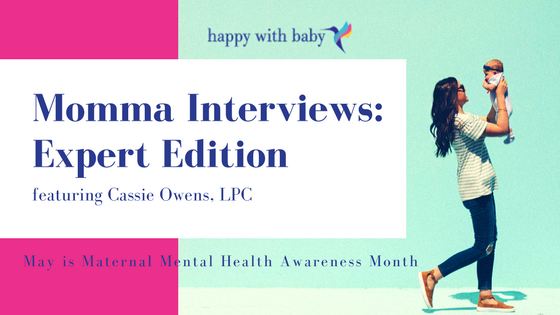
May is Maternal Mental Health Awareness Month, so I've relaunched my "Momma Interviews" series--This time with an extra special set of moms. These mommas also work to support other moms and their families during the transition into new parenthood and beyond. I'm calling it the "Expert Edition", but I think you'll find that while these women definitely are experts in their work, parenthood has a way of making a beginner out of everybody. Even experts get surprised by the unexpected and learn new bits of wisdom while in the trenches!
This series is all about their experiences with motherhood, in the hopes that it provides you with some validation and new tips to try. Because for all the many different ways there are to be a mom (and there are definitely MANY ways to do it right), it's so amazing how much we moms all really have in common.
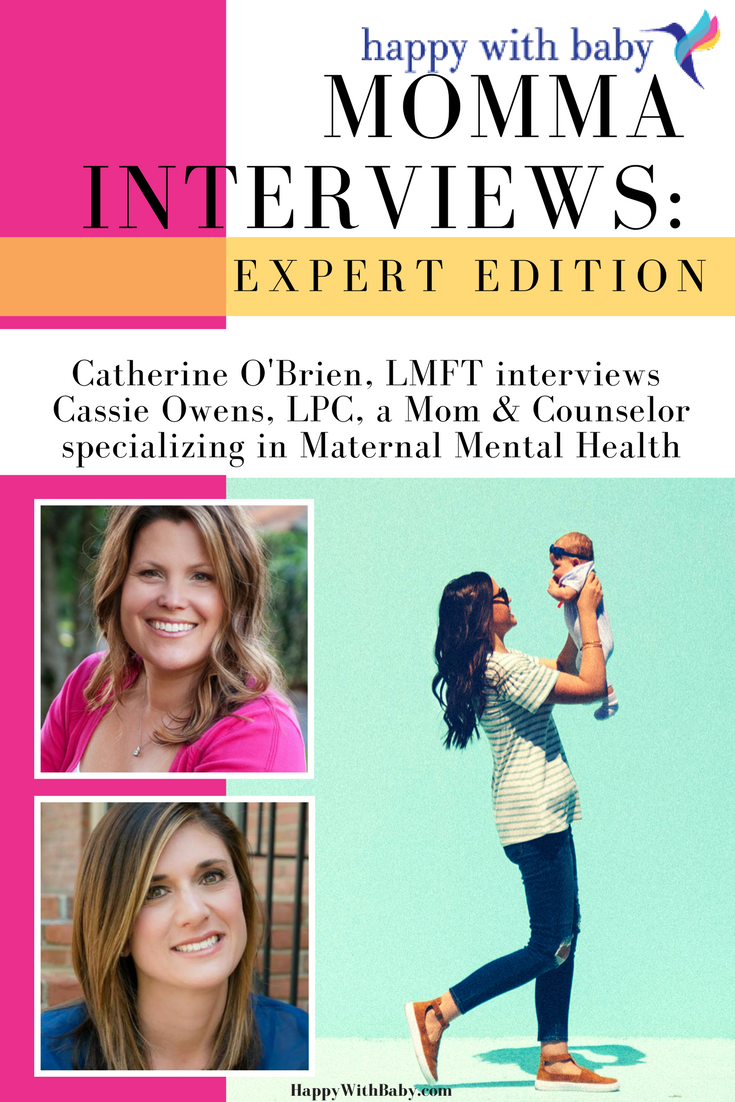
Today, I'm chatting with Cassie Owens, LPC. She's a mom of two in Atlanta, GA, and is a licensed professional counselor specializing in maternal mental health. She's got some great advice that every mom should prioritize in her life (ahem, boundaries!). And I also find her story really interesting because she's a prime example of a mom who didn't experience any postpartum mood disorders with her first baby, but did experience postpartum anxiety and depression with her second--which just goes to show that there are so many variables at play and it's so hard to predict how you'll feel.
Scroll down to watch the interview, read the transcript or learn more about Cassie and her work below.
Watch Video:
https://www.youtube.com/watch?v=I_N8YHBEsXQ&w=854&h=480
Cassie's Quotables:
Interview Transcript:
Catherine: Hi. I'm Catherine O'Brien at happywithbaby.com, and I'm so excited to be here with Cassie Owens, a psychotherapist in Atlanta specializing in maternal mental health. We are doing another Momma Interview series with her today. Thank you, Cassie, so much for being here. I'm so excited you agreed to do this. Why don't you tell us a little bit about your family and what makes up your family.
Cassie: Yeah. Happy to be here. I am married to my husband named Russ, and we've been married for, it'll be 12 years in November. We have two children. My son Brennan is nine. He'll be 10 in October, and my daughter Coco is eight. She just turned eight.
Catherine: Oh, wow. My son just turned eight, too.
Cassie: Oh, yeah.
Catherine: It's a fun age, huh?
Cassie: Yeah. It is a good age. Yeah.
Catherine: Tell me, how do you balance being a mom, working, and your relationship roles?
Cassie: Oh my goodness. It's a struggle everyday. I feel like I'm constantly trying to find the balance in it all, and I feel like I talk about that at work, and I talk about that with my friends, but I think, kind of, one of the biggest things that I try to do, and I feel like I'm reworking my plan all the time, is, you know, setting boundaries in order to find the balance, you know, whether it's, you know, creating, saying no to things. Like, someone really nice, like a great compliment a few years ago, was like "We think you would be really great as PTO president," and I was like "That sounds like a lot of work, and I can't have that on my plate right now." I would love to do that, but I can't do that.
Catherine: Yeah.
Cassie: Like, saying no to certain things. Even, like, in work stuff, creating boundaries there. Like, I ... I think you know that I have an out of office, or an automatic reply that comes when an email is sent, and that is really to help kind of give expectations of when I will respond, so again, setting boundaries [inaudible 00:02:17]. I mean, "This is when I'm gonna respond, because this is my work time," and then, like, really try and kind of shut off my brain when the kids come home and be like "Okay. This is kid time." Then, of course, my husband needs some time, too.
Catherine: Right.
Cassie: So, it's ... I don't have the ... I forget, now, the question, but, like, how do I balance ...
Catherine: Yeah, like how do you ... Yeah, and I think you answered it, by setting those boundaries and stuff.
Cassie: Okay, good.
Catherine: Yeah, exactly.
Cassie: Yeah. I try.
Catherine: Well, you're the one that, like, inspired me to have that auto office reply email.
Cassie: Right. Yeah. Yeah.
Catherine: And you'll be like "Oh my gosh, it makes ... " It does feel better, because then it's like, because, like, an email would come in, and you're like "Oh my gosh. I gotta respond right away," but I'm in the middle of dinner with my family or something. You know?
Cassie: Yes. Yes. Then, you don't feel as bad, and you know that the expectation is set, and even if you do respond within, you know, the hours, that's okay, but it's not expected, so yeah.
Catherine: Right. Yeah. Cool. Most moms I speak to say there are moments when they're kind of ready to throw in the towel, like things get so overwhelming. Can you describe a time that you felt this way and what got you through it?
Cassie: Yeah. Like, everyday, every afternoon. I'm kidding. Wine?
Catherine: The witching hour.
Cassie: Yeah. I mean, it's hard when kids come home from school, 'cause my kids are eight and nine, and they're tired, and they're hungry, and they want snacks, and ... I mean, I guess now, it's different from when they were itty bitty, but, you know, now, it's just ... It's hard to manage, because I've worked all day. I'm tired and hungry, and they're at school and tired and hungry, and there are some days where I'm just like "I can't deal with anything." I think, for me, and as a therapist, really, like, acknowledging when I'm really frustrated is helpful, like, and that it's okay, and that's fine, and that it's okay to feel like I want to throw in the towel. Well, I know I won't, because I love them, but I think, you know, getting support from whether it's like friends or family or my husband saying, like, you know ... When they were little, it would be like "When are you coming home, because I need help."
And I think having good, like, self-care type stuff helps to counterbalance the hard times, so, like, if I did things that make me feel good. Like, I like to work out. That's kind of one of my, like, therapies. If I'm getting that, then, like, I can handle the harder times better. It doesn't make it perfect, but I think knowing when I need to take a time out for myself, step away. But, yeah. I mean, it's just hard, because ...
Catherine: No. It is.
Cassie: Yeah.
Catherine: But, yeah. I think having that, you know ... I mean, that's part of the balance is that, having that self-care piece in there, which makes a huge difference, or knowing, like, "Okay. This is hard right now, but I know I'm getting this time for me," so it almost makes it ...
Cassie: Yeah. Look forward, something to look forward to.
Catherine: Yeah, like easier versus, like, "Ah. This is. There's no light at the end of the tunnel," and ...
Cassie: Right. That's great. Yeah.
Catherine: ... and it's just like overwhelming. Yeah.
Cassie: Yeah. Yeah.
Catherine: What do you do ... I mean, you kind of already said this, but what do you do when you feel overwhelmed, overstretched, or less than?
Cassie: Remind myself I'm not the only one.
Catherine: Yeah.
Cassie: When I feel overstretched, I will probably, like, talk to my husband and be like "Is there something that you can help with? Is there something that I can be really, like, backing off of?" He'll be like, "You know, maybe you don't need to take on X, Y, or Z," or like "It's okay if the house is a mess," and I'm pointing to my house, because it is a mess, and there are dishes everywhere that you can't see, but like just reassuring that, like, I don't have to have everything nailed down perfectly, because that might be something that would stress me out is, like, you know, having the kitchen look the way it does right now. I think talking to him and ... I mean, I just know that I'm not the only one and, like, that ... Yeah.
Some days, I'm like "Am I a crappy mom? Am I not doing a good job? Am I not spending enough time with them?" but I know that there are the moments that everyone ... No one has a perfect 24/7. It's just not the way life is, so I think just reminding myself, like, you know, "I do enjoy these." I do enjoy moments that I don't feel like I want to throw in the towel and just kind of thinking back. You know? I think morning and evening are good, like, you know, cuddle time and snuggle. "Oh, you're so good, and you're going to bed." You know.
Catherine: Yeah, and thank goodness, because then I can go to bed, too.
Cassie: Yeah, yeah, yeah. Exactly.
Catherine: Yeah, and we'll start all over tomorrow [crosstalk 00:06:52].
Cassie: Yeah. Yeah.
Catherine: Yeah. I've also had parents tell me one of the hardest things about being a parent is the comparisons and judgements from other parents. Have you experienced this, and if so, how did you cope with that?
Cassie: You know, I don't really think that I've felt that way. I mean, I think more so than, like, parents, I mean, I think people are always trying to tell you what to do, like "This would be better. Oh, well they should sleep here, and you should use this sleep sack, and you should feed them this." But I never felt personally attacked in any way, but I feel like there are a lot of judgements out there in society, whether it's like social media or, you know, "Feed this way. This is the best way, and if you don't, then you're not good enough." I think they mean our field and just knowing that has kind of made me not really respond or, like, even notice if I'm, like, being judged or whatever. I'm just like "Whatever."
Catherine: Right, right.
Cassie: I don't care. I'm [inaudible 00:07:57]
Catherine: Yeah. Exactly, like do what works for us, you know?
Cassie: Yeah, yeah. I mean, of course I've ... I'm trying to think back to when the kids were, like, little. I'm sure at that time, because I did struggle a little bit more when they were younger with, like, anxiety and depression and just not feeling, you know, right, like that postpartum, that year. I probably did. Well, it was harder on myself. Probably, I judge myself more so than anyone else.
Catherine: Like, comparing, like, what you think other people are doing versus what you're doing?
Cassie: Yeah.
Catherine: Yeah.
Cassie: Yeah, like comparisons, and I think that is something that a lot of moms do. It's like "Oh, my maybe [inaudible 00:08:37] this pounds or that ... " Even in saying something as, like, "Oh, well my baby weighed in X amount of pounds at six," some other parent is thinking like "Oh, crap. Your baby is gaining weight. My baby's not eating enough," and then they feel bad, or like "My baby's this tall," and you're like "Oh, my baby's not long enough," and the crawling and the developmental milestones, like if ... They just vary so much that first year that it's, you know, it could hurt ... You know, it can make you feel like you're not doing something right, even though just that's just the way babies are.
Catherine: Yeah. Right, right. They're ... I think that's, like, having my second really made that so much easier, because I'm like "Oh, yeah. Like, she's totally not doing what he did." You know? Like, even growing-wise, like, he totally took off, you know, was in, like a month, was in, like, three months to six month clothes, you know, where I'm like "What? You're still wearing newborn clothes? How is that even possible?"
Cassie: Yeah. Yeah, yeah, yeah, yeah.
Catherine: No.
Cassie: Yeah.
Catherine: Yeah, so, and it is. People, I mean, I think say things in a way that they don't realize it comes off, and I think if, you know, we are having a hard time, we're like "Oh my gosh. You're judging us." Like, "Oh wow. Your baby's so big." Like, "Oh my gosh. You're saying my baby's fat?" Like I'm doing something wrong.
Cassie: "Am I feeding him too much?"
Catherine: Yeah, exactly.
Cassie: Yeah, yeah.
Catherine: Whereas I think sometimes they can be innocent comments, but, I mean, we do. Like, we worry, because we're like want to do the right things and ...
Cassie: Yeah. Of course.
Catherine: Yeah.
Cassie: Yeah.
Catherine: Yeah. Okay. What do you feel like your greatest personal struggle with the experience or motherhood is or has been?
Cassie: Oh. That's a tough one. My, the greatest personal struggle. I mean, I guess, you know, just experiencing with my first definitely had, like, the blues. You know, not really having any history with depression or anxiety, the first, definitely, like, feeling the blues, like "Oh, okay. Write about this. This is here." The second, struggling more with anxiety, depression, that was really hard, something unfamiliar, and just not being happy. I was like, just like I'm sure you've heard a million times, "All I've ever wanted to do is be a mom, and now I'm not happy. Like, what's wrong? Like, why am I not being being fulfilled right now at this time?"
But really, it's not fun when you have two babies that are 16 months apart or 17 months apart. It's a lot of work, and I think that's one of the hardest things is like this is the hardest job ever. I mean, it's so wonderful in so many ways, and, like, to see these people everyday that like came out of my body, I'm like "Oh my goodness. Like, this is awesome, and they're so fun," but no one tells you how hard it is 24/7. It's like the hardest job ever.
Catherine: Right, and I think that's like, yeah, you can still love them and still think this is hard and I can't do this some days, and yeah.
Cassie: Yeah.
Catherine: Yeah, yeah.
Cassie: Like, you know, you don't get a day off. It's not like you can call in sick and be like "Okay, so I'm not gonna come to work today." You know, still need to eat and stuff, so ...
Catherine: Yeah, yeah.
Cassie: But yeah. Just, I think, you know, the hardest thing is just coming to terms with, like, this is not, you know, the way it looks, you know, not the way you thought it would be, but I think a lot of people have this idea and perception of how, like, "Oh, when I have a baby, I'm just gonna, like, strap them on my back and go, like do everything I used to do," and, you know, just how that changes. Like, we were talking today earlier about how before you have a baby, it's like you're never that person again. I mean, the core of you is there, but, like, you just, you're changed a little bit.
Catherine: Right, right. Right. It definitely changes you, for sure.
Cassie: Yeah. Yeah.
Catherine: What's something that has surprised you about being a mom, maybe something you didn't realize that you'd enjoy or something you didn't know babies or kids did or maybe even something you didn't know could bring you in so much joy?
Cassie: I mean, I think, like, not realizing how much I could love somebody, you know, just ... I mean, I love my husband, too, you know, but it's like that ...
Catherine: Yeah. Right, but in a different way.
Cassie: But in a different way, and like, I didn't know that I could even love someone as much as loved him, so, like, you know. It's weird. Like, every night, my kids still like to be snuggled before bed, and like, I remember when they were like itty bitty babies, and I'm like "This is so amazing. Like, what happened? Like, eight or nine years ago, like, just like flew by. Like, it flies by." I was thinking about this last night, and I'm like "How did it go from, like, he was a baby into, like, he's gonna be in fourth grade?" Like, that's crazy. I don't know. I mean, it's just, it's amazing. It's such a cool thing to see, like, someone who you brought into this world learn and grow and read and have their own interests, and, like, sometimes they're similar. Like, my son said to me "You know, like, you and I both have ... " I think he said like "broad shoulders" or something. I thought it was like cute, because he was like comparing, he was like "We're alike in this way."
Catherine: Yeah.
Cassie: But yeah. It just, I don't know, it's just cool.
Catherine: Yeah. It is. It is really awesome. It's awesome to be able to see it, you know, [inaudible 00:14:01] to people that look, like kind of sit back and look, and like "Wow. Look at what they're doing and how they think, and ... "
Cassie: Yeah. They're their own person, really, so ...
Catherine: Yeah. Yeah. It is amazing.
Cassie: Yeah.
Catherine: How has your relationship with your partner changed or, and how has it stayed the same?
Cassie: Well, I think, like, prior, pre-kids ... I mean, I think that what stayed the same is that we love each other. You know, we are a pretty strong couple, I would say, and ... But I think how it's changed is that we really have to plan and, like, schedule time, which is not something we had to do before. It was like "Oh, we're gonna go to dinner. We're gonna do this, and we're gonna hang out together, and we're gonna ... " Like, and that was something where ...
There was a time, I think, when my daughter was four or five months, and so she was four of five months, and my son was probably, like, whatever, 20, 21 months, like two babies, right? I'm with them all day, and I'm tired, and I don't want anyone near me, because I'm holding two and feeding both of them and all that, and he was like "I feel like we're too ... " Because then, he would come home, and I would be like "Here you go, and I just want to be alone," and like, you know, "Leave me alone," and he was like "I feel like we're two ships passing in the night. I'm working all day, and, like, I come home, and I want to, like, have conversation, and you're, like, tired of babies, and you just want to be alone." It was the first time where I was like "Oh, shit. Yeah. We're not really hanging out, and that wasn't like us ever." It was at that point that we started doing, like, date night swaps with our neighbor, which was pretty awesome.
Catherine: Oh, awesome.
Cassie: From then on, it was just more, I was more cognizant of it, like "Okay. I gotta make time for him, too." Like, you know, I got to make time for me, make time for my son, make time for my daughter, but I need to make time for our relationship, and that's really important, and that will keep us strong so we can parent, you know, strong.
Catherine: Right. Right.
Cassie: So, I think ... That was luckily ... You know, he'd said something early on, because if he didn't, then, like, how would I know, but that really triggered ... That just was really like "Okay. This is important to him." It's important to me, too, but when you're in that fog, you're not really ...
Catherine: Yeah, and you're like "I'm tired. Like, I can't think beyond my own needs right now."
Cassie: "My [crosstalk 00:16:20] What are you talking about?" I'm like, yeah.
Catherine: I'm, like, meeting other people's needs all day.
Cassie: Yeah, so it's changed in ... I mean, and now the kids are older, and we can get babysitters and go out, but we do make sure that we have those times that are just us, which is just harder than it was before. You know, it's just more of an effort, but an effort that we like putting in. You know?
Catherine: Yeah, yeah. That's good.
Cassie: Yeah.
Catherine: How has your relationship with your friends, family, or support systems changed, or how has it stayed the same?
Cassie: I think with friends, like, for sure, it's, you know, put a strain in a way that ... I don't know if you're familiar with Atlanta, but it's a pretty big city, so we're, like, spread ... A lot of people are spread out, whereas when we were not married, in our early 20s, we all kind of lived in the same area, closer to the city, and then, as we got married, people moved to the burbs here and there, and so we're spread out. Then, you throw kids in the mix, and it's harder to meet up and get together, so I think, you know ... I have friends that live close by and see them, but I think technology has been a big help in that, you know, what's been the same is that, like, you know, people are still my ... Like, my friends are still my friends, right?
Catherine: Right.
Cassie: And I can keep in touch with them over Facebook or text messaging or whatever. I don't really talk to a lot of people on the phone anymore. I don't know if people do that still, like talk on the phone, but I think it's changed in that way. It's like I don't spend a lot of time with friends, but the same kind of thing in that we'll have to make the plan, and it is kind of like ... I just texted one of my girlfriends who I hadn't seen in a while, and I was like "Let's do happy hour," and it's like "When can we do it?" It's, like, a scheduling nightmare, because it's like "This one has activities," "That one has activities," "Husband's [inaudible 00:18:19]," yada yada yada. It's a logistical thing, so I think that part is harder, to actually have the face to face time, but what's not changed is, like, I know any of my girlfriends who I don't see as often, like, I have my core group that I see often, but who I don't see, if I needed something, they would be there. You know, like, they would be there. Absolutely.
Catherine: Yeah. Yeah. No. I know, technology, I think it's, like, in, like, the social media, I like that there's so much positive to it, and then ...
Cassie: Yeah. [crosstalk 00:18:51]
Catherine: There's the challenges. Yeah.
Cassie: Yeah.
Catherine: It's like "How do you use it for good?"
Cassie: Yeah, and even [crosstalk 00:18:56]
Catherine: That's a good way. Yeah.
Cassie: Yeah. I mean, it's ...
Catherine: Mm-hmm (affirmative).
Cassie: My family is not here in Geor-... Well, my husband's family is, so we get to spend time with them and see them, but my ... One of my sisters is in Oklahoma. The other one's in New York, and my mom's in New Jersey, so ... And my dad's family is in New Jersey, so, you know, it's harder when you have kids. You can't just, like, pop on a plane all the time, and we are able to do that, but, of course, again, it's all about just making it happen and prioritizing things that are important and people I want to see.
Catherine: Yeah, yeah. What's one of the greatest lessons you've learned as a mom?
Cassie: Oh. Hmm. I think ... I feel like not just me but all of my friends and, like, women in general who become mothers, pretty much badasses, I was going to say, because we wear a lot of hats, and even though it's not this case always, I think a lot of times, like, women are the default parent, and we just know a lot, and I think ... What was the original question? I forget.
Catherine: What's one of your ... What's one of the greatest lessons you've learned?
Cassie: Oh. The lessons.
Catherine: What a badass women are.
Cassie: [crosstalk 00:20:15] Yeah. Like, you know, it's just hard work. I mean, and it's, it's just a lot of ... It's just a lot of stuff that you can't even plan for. I mean, yeah, there's so many books out there, but I think ... Oh. What's the lesson that I've learned? Oh. I don't know. It's just, just, I guess, you know, prioritizing and why that's important and setting boundaries and trying to, like, be good examples for my children so when they grow up, like, they know what a healthy lifestyle is. I don't mean, like, physical, of course physical, too, but just like with setting boundaries where it's "Okay, you don't want to do a million activities," like, "We can't [inaudible 00:21:02] ourselves in. We have to, like, have some family time and be grounded," and that's hard, but just really prioritizing and ...
Catherine: Yeah. Yeah, like modeling that for them.
Cassie: Yeah, yeah. Totally.
Catherine: Do you have a favorite quote that inspires you as a mom?
Cassie: I saw that question, and I was like "Oh. I don't have a quote," but then I thought "I do, actually." I have one of those ... It's not, like, some fancy quote, but I have one of those.
Catherine: We don't need fancy.
Cassie: [inaudible 00:21:35] I have one of those ID bracelets for when, like, when I would run or something like that, just to, in case something happened. It's funny, because when you make the plate, you put, like, your name and, like, emergency contact information, and you can put a quote, like an inspirational quote, and my quote is "You can do it." I just think that really applies to everything in motherhood, like "You can do this," like "You've got this." You know, "You can do it," just, you know, "You'll figure it out."
Catherine: Yeah. No, that's cool.
Cassie: "There will be a way." Yeah.
Catherine: Yeah. That's a good one. Do you have a favorite song that inspires you as a mom?
Cassie: Oh, I didn't think about that. No. I can't think of that. Sorry.
Catherine: No, no. That's fine. That's fine. How about a "I can't live without it" gadget or some product or something that you think makes life easier.
Cassie: I saw that, and the first thing that came to my mind, since I'm out of the baby stage and things have changed really ...
Catherine: Oh. So dramatically.
Cassie: ... [crosstalk 00:22:38] over in eight or nine years, but one of the things that I love, well, A, is drive-through anything that makes life easier, drive-through pharmacy, drive-through coffee, drive-through dry cleaners, they make life easier, and delivery services like Instacart we have here.
Catherine: And those have popped out everywhere now. Those are amazing. Yeah.
Cassie: Yeah. That is something that I wouldn't say I can't live without, but it's really, really helpful, anything that can, like, you know, lighten the load. But that's the first thing I thought of when I saw that. I was like "I don't have any gadgets but have that." Yeah.
Catherine: Yeah. Those are good ones. Then, so the final question is what's one piece of advice you'd like to give other moms or your final thoughts there?
Cassie: I think I would say, you know, that it's, you know, this is a wonderful experience, and it's amazing to have children. However, the reality is there are a lot of parts of it that aren't fun, and it's not like you read about, not like you see on TV and even on social media. Like, it's okay to love being a mom and love your children but sometimes have days where you hate everything, you know, and just really normalizing, like ... Because I think we have this false expectation that things are going to be perfect all of the sudden when we have kids, like "Oh, I'm gonna like, you know, look really good, and I'm gonna make meals, and everything's gonna be clean and neat," and, like, that's not real.
Catherine: Right.
Cassie: That would be nice, but it's not real.
Catherine: Yeah.
Cassie: And I think just normalizing, whatever your experience is, it's normal, it's valid, and I think for moms to know that they are not alone in not having always perfect days, really, but to really cherish the times that you do enjoy, because that's what matters, and remembering those moments where you're having a good time, because that's when you're making memories, and I think that's important.
Catherine: Yeah. No. That's awesome. Thank you.
Cassie: Yeah. You're welcome.
Catherine: Thank you for being here, and you guys should totally check out Cassie's website. She's got some great stuff out there in Atlanta, and I know you guys are doing great things in Georgia for maternal mental health, so ... Thank you for being here. Thank you for sharing ...
Cassie: Welcome.
Catherine: ... your wonderful wisdom, and ...
Cassie: I hope so. Excuse me.
Catherine: Yes. Definitely, so take care.
Cassie: Yeah.
About Cassie Owens, LPC:
Cassie Owens is a licensed professional counselor in private practice with a specialty in maternal mental health. She is vice president of the Georgia chapter of Postpartum Support International, and is experienced in training clinicians, birth workers and healthcare professional regarding perinatal mood and anxiety disorders. While her practice focuses heavily on individual work, she also sees couples and offers a free pregnancy and postpartum support group twice a month. Cassie is passionate about her advocacy work to lessen the stigma of maternal mental health and increase accessibility to resources for new moms and families in Georgia.
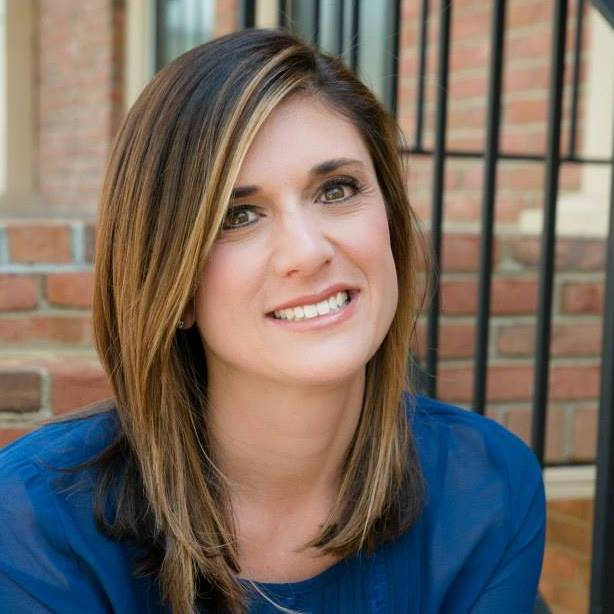
Connect with Cassie:
Website: www.postpartumatlanta.com
Social: www.facebook.com/PSIGACHAPTER/
Subscribe
Sign up to get the latest weekly blogs sent straight to your inbox


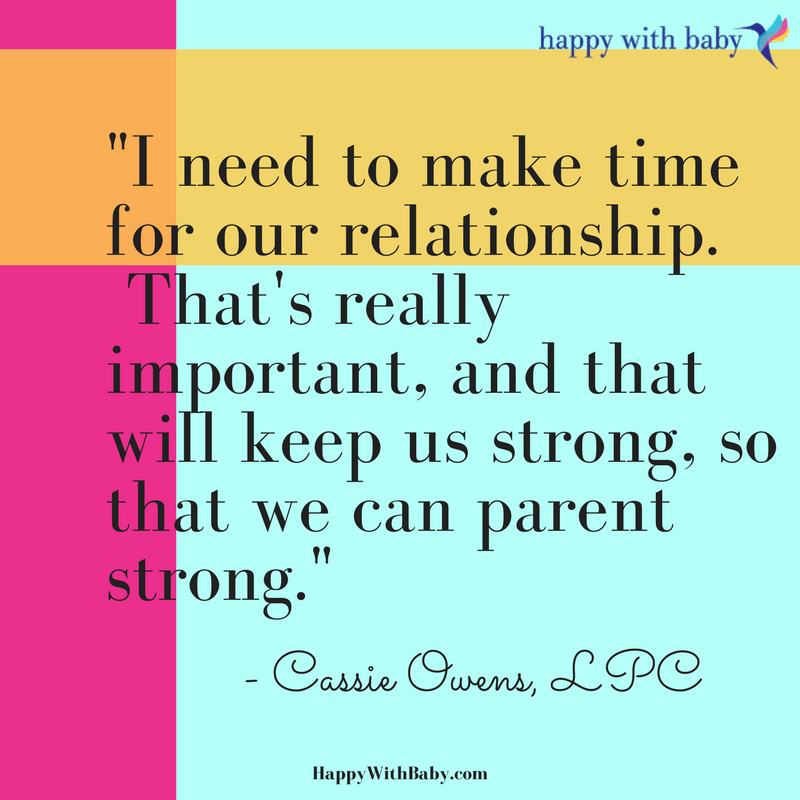
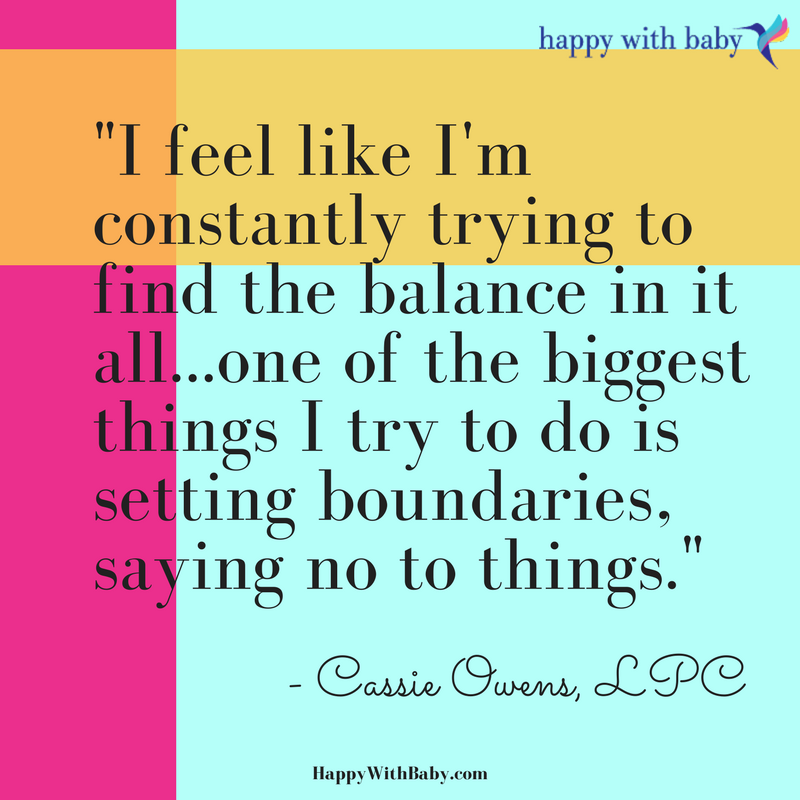
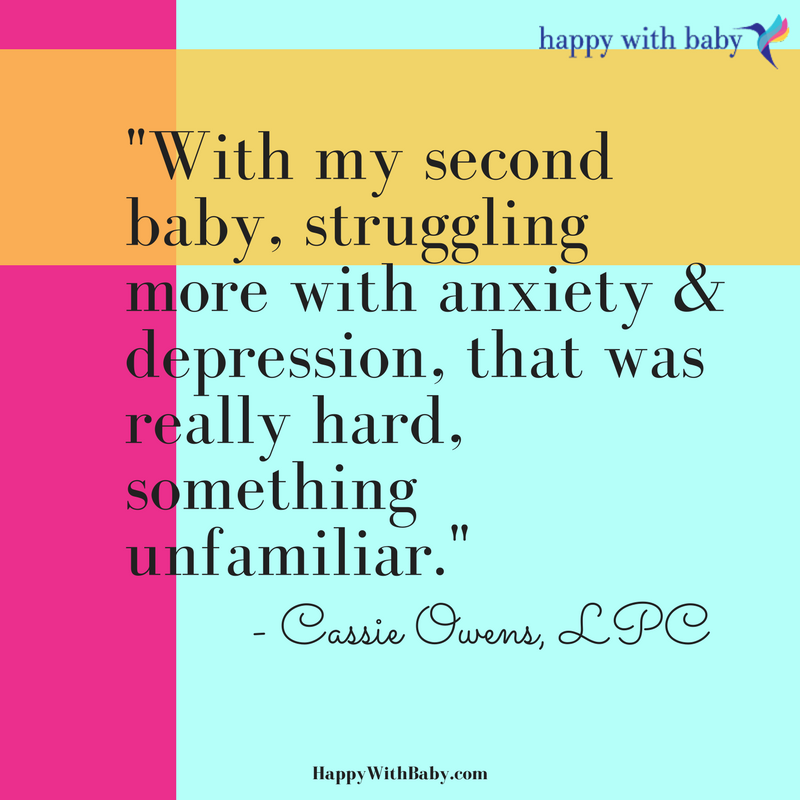
0 comments
Leave a comment
Please log in or register to post a comment